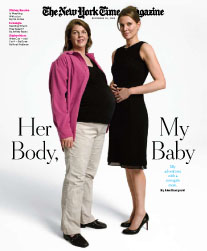To not be able to give birth to your biological child can be devastating to many couples seeking to become parents. However, within recent history, options for creating a family have expanded with the mainstream use of donor eggs, donor sperm, embryo adoption, and the legalization of gestational carriers.
Candidates for gestational carriers either use the eggs of the intended mother or the eggs of a third party ovum (egg) donor.
In essence, a woman becomes a carrier for a couple’s embryo acting as a host. After delivery, the child legally becomes a member of the sponsor family who has contracted with the gestational carrier prior to delivery.
This arrangement, while not allowed in many foreign countries, has become a viable option for many who reside in the United Sates or travel to the U.S. to seek fertility treatment.
(Read a related article about Fertility Tourism)
Reasons to use a surrogate?
There are many reasons people use a Gestational Carrier including:
• Advanced maternal age
• Women who have had their uterus removed
• Women whose uterus does not function properly
• Repeat unexplained pregnancy loss
• Women who have had multiple poor pregnancy outcomes, such as second trimester losses and/or very premature births
• Women who have medical conditions for which a pregnancy would put their lives at substantial risk and those who have experienced severe complications resulting from a pregnancy
• Same-sex family building.
The option to use a surrogate may involve using the couples egg(s) and sperm, donor egg(s)/sperm, or embryo adoption.
What exactly is the role of a Gestational Carrier (aka surrogate)
A Gestational Carrier is a woman who becomes pregnant, carries a fetus throughout a pregnancy and delivers the child for another couple. This person will have no genetic connection to the fetus, thus acting as simply a host for a pregnancy for another couple. Legal documents will identify the couple engaging a surrogate to host their baby and will outline the details as it relates to the child being adopted upon delivery.
How to become a Gestational Carrier?
Becoming involved as a gestational carrier so that others may become parents is one of the most honorable and appreciated roles a woman can take. Here at the Fertility Institute of Hawaii, we work in tandem with couples to ensure a suitable carrier is chosen, and can suggest appropriate legal counsel. In addition, we give the utmost care to the gestational carrier during the implantation and follow-up process.
There are safeguards to consider when selecting a gestational carrier and for the future parents as well:
– Previous successful pregnancy and delivery
– Be at least 21 years of age and preferably less than 40
– Non-smoker, non-recreational drug user, agree to abstain from alcohol consumption during the pregnancy
– Pass health assessments
– Agree to legal contract between the couple or individual asking for a gestational carrier and the carrier herself.
What to expect once accepted as a Gestational Carrier:
Surrogacy is an involved process and Dr. Frattarelli at our fertility center will go through the entire step by step protocol with both the Gestational Carrier and the future legal parents. We are committed to helping the surrogacy process go as smoothly as possible.
Here are some videos from our playlist that offer additional insight.
About egg donors and egg donation
Fertility options for patients over 40
To read more about the surrogacy process outlined on our website, please click here.
